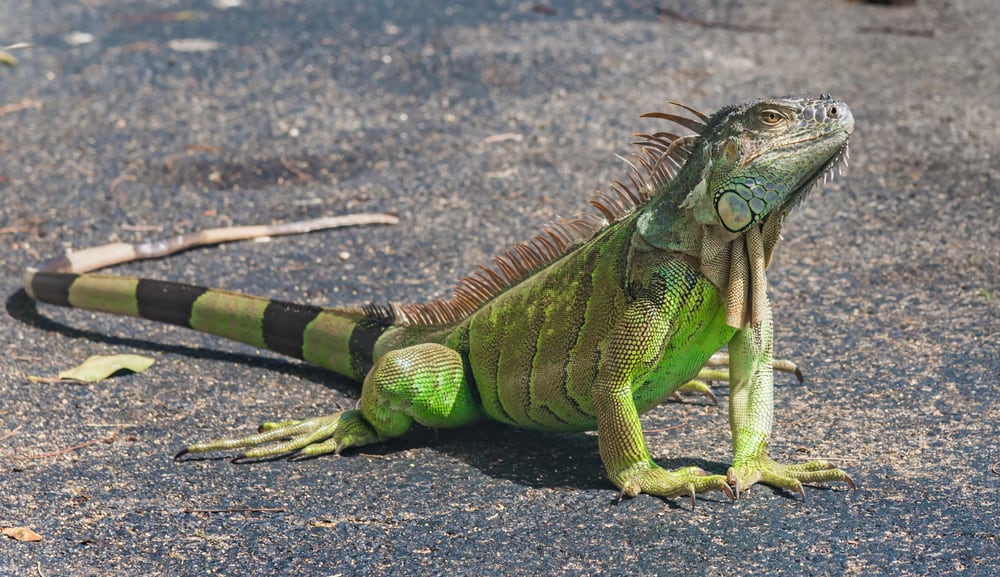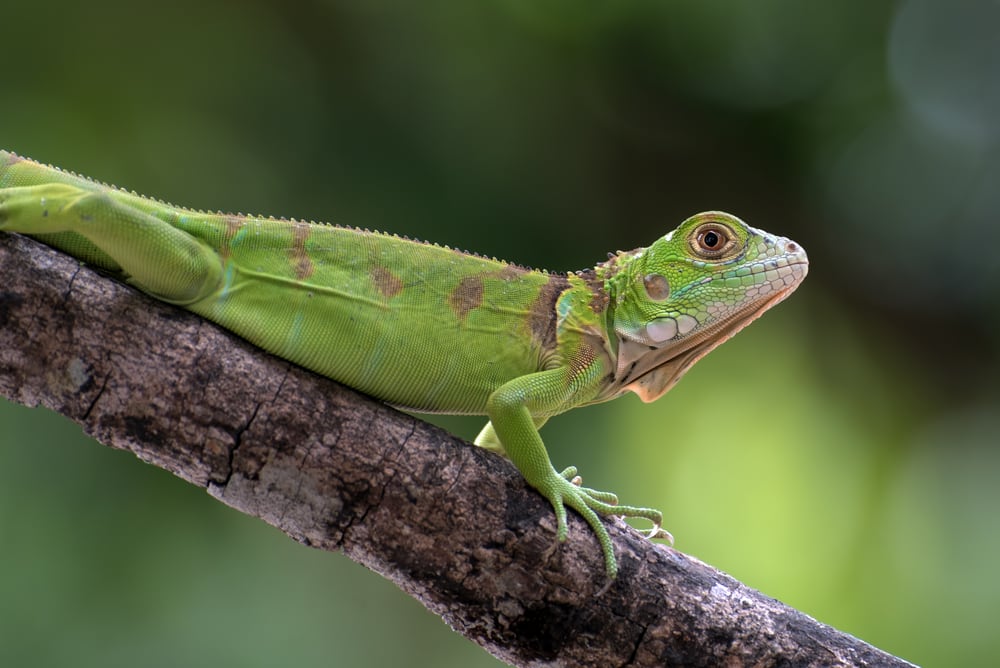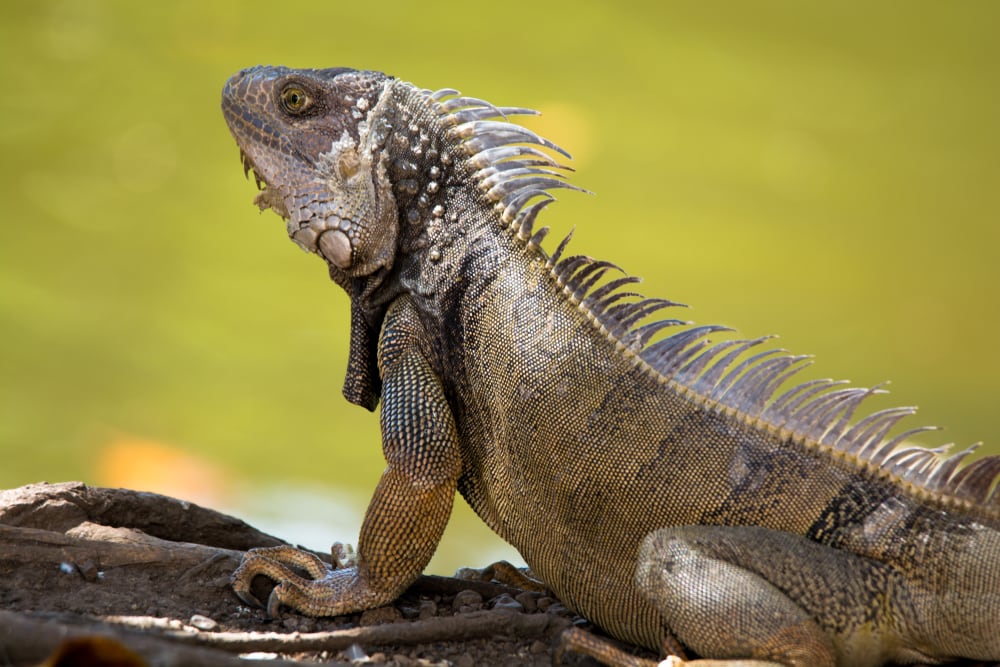In Florida, the rapidly multiplying iguana population has caused significant challenges due to their invasive nature. Residents and enthusiasts may wonder about the legality of hunting these reptiles. Yes, you can legally hunt iguanas in Florida because they are considered an invasive species, iguanas can be a danger, and are not protected by law.
Because they are an invasive species, Florida permits iguana hunting on both public and private lands, provided hunters adhere to certain guidelines. Approximately 25 public areas in South Florida allow iguana hunting without requiring a specific permit. On private property, hunters must obtain explicit permission from the landowners. Using pellet guns and other legal firearms is permitted, with the stipulation that local regulations are followed.
Before embarking on an iguana hunt, it is essential to be informed about the relevant state and local laws to ensure compliance and humane practices. There are opportunities to book guided hunts through professional services, enhancing both safety and success rates. By understanding the legal framework and best practices, hunters can responsibly participate in this unique Floridian activity.
Looking at Iguana Hunting at a Glance
In Florida, green iguanas are considered an invasive species and are not protected except by anti-cruelty laws. They can be humanely killed year-round without a permit or hunting license on private property and on 32 public lands in South Florida. There are no bag limits for iguanas, meaning you can capture and humanely kill as many as you want.
Additionally, iguana hunting is legal, and they can be captured and humanely killed on private property without a permit. However, while there are no specific protections for green iguanas, it is important to follow Florida’s anti-cruelty laws when dealing with these animals.
In Florida, animal cruelty laws are stringent and comprehensive. Under Florida Statutes § 828.12, animal cruelty is defined and penalized as follows:
- Misdemeanor Animal Cruelty: A person commits this offense if they unnecessarily overload, overdrive, torment, deprive of necessary sustenance or shelter, or unnecessarily mutilate or kill any animal. This is considered a first-degree misdemeanor, punishable by up to one year in jail and a fine of up to $5,000.
- Felony Animal Cruelty: This occurs when a person intentionally commits an act that results in the cruel death or excessive or repeated infliction of unnecessary pain or suffering on an animal. This is a third-degree felony, punishable by up to five years in prison and a fine of up to $10,000.
- Aggravated Animal Cruelty: More severe cases of cruelty can result in separate charges for each animal harmed.
- Neglect and Abandonment: It is illegal to neglect or abandon pets, and specific statutes outline the requirements for providing appropriate care.
These laws ensure that animals are protected from cruelty and that offenders are appropriately penalized for their actions. If you want to rid yourself of iguanas, it’s imperative you keep these laws in mind.
Understanding the Iguana Issue in Florida
Florida faces significant challenges due to the presence of invasive iguana species. These iguanas have affected the local ecosystem and raised concerns among environmentalists and residents alike.

Invasive Species Concerns
The green iguana, originally native to Central and South America, has flourished in Florida’s subtropical climate. Introduced through the pet trade, these reptiles have since established feral populations. Their presence is problematic because they outcompete native species for food and habitat.
Green iguanas are adaptable and rapidly reproduce, making management difficult. Their populations have become so vast that the state encourages their removal by licensed hunters. The Florida Fish and Wildlife Conservation Commission (FWC) does not protect iguanas, allowing for legal hunting with minimal restrictions on methods and bag limits.
Impact on Ecosystem
Invasive iguanas have caused ecological damage by feeding on native plants and disrupting natural habitats. These reptiles consume a variety of vegetation, which affects the food supply for native herbivores. Their burrowing behaviors undermine infrastructure, damaging sidewalks, seawalls, and even foundations of buildings.
Additionally, iguanas pose a threat to local wildlife. By preying on bird eggs and hatchlings, they reduce the populations of native bird species. The ecological imbalance created by their presence necessitates urgent action to protect Florida’s unique biodiversity.
Understanding these impacts highlights the importance of managing the invasive iguana populations to preserve the state’s ecosystem. Effective strategies involve both public awareness and active participation in control efforts.
Legal Framework for Iguana Hunting
In Florida, hunting iguanas is regulated by specific state laws and regulations. Hunters must adhere to guidelines regarding methods of hunting and may need to secure certain permits or licenses.
State Regulations
Florida classifies green iguanas as invasive species, which allows for certain liberties in hunting them. These reptiles are not protected by wildlife conservation laws, making it permissible to hunt them throughout the state. According to Florida Wildlife Commission (FWC) regulations, legal methods include using air rifles, pellet guns, and other non-lethal means.
However, ethical hunting practices must still be observed. The FWC mandates humane methods to ensure the welfare of animals. For example, ensuring a humane kill involves immediate steps to minimize suffering.
Permit Requirements
Hunting iguanas in Florida typically does not require a special permit or license for private properties. Property owners are encouraged to control iguana populations to prevent damage and nuisance. On public lands, hunting regulations might vary, and it’s essential to check local laws.
Using firearms or pellet guns imposes additional requirements. Firearms usage must comply with state and local statutes, including possible necessity for a hunting license.
For more accurate details, refer to the FWC’s iguana hunting guidelines, or check local regulations for specifics.

Effective Iguana Control Methods
Controlling the iguana population in Florida requires specific removal techniques and community efforts to manage them effectively. If a landowner does not want to hunt the iguana him or herself, a company that offers iguana removal services can be brought in instead.
Humane Removal Techniques
Iguanas can be humanely removed using various methods. One popular technique involves using live traps, which can capture the reptiles without harming them. These traps should be placed in areas where iguanas are frequently seen. Once captured, the iguanas can be transported to appropriate facilities for relocation.
Additionally, using non-lethal deterrents such as motion-activated sprinklers or repellent sprays can discourage iguanas from entering certain areas. These methods are effective in protecting gardens and residential spaces without causing injury to the animals.
For those who opt for hunting, it is crucial to follow guidelines ensuring the humane dispatch of iguanas. This includes the use of air rifles or pellet guns and adhering to recommended protocols for a quick and humane kill.
Community-Based Initiatives
Community involvement plays a vital role in controlling the iguana population. Local authorities and organizations often provide education and resources to residents on effective iguana management practices.
Public awareness campaigns can inform residents about the impact of invasive iguanas and encourage participation in removal efforts. Workshops and training sessions on humane removal techniques can equip community members with the skills needed to contribute to control measures.
Furthermore, community projects such as organized hunting events or neighborhood clean-up drives can help reduce the number of iguanas in specific areas. These initiatives promote collective action and can lead to more coordinated and successful iguana management efforts.
By combining humane removal methods with community-based approaches, Florida can better manage its iguana population while minimizing harm to the animals and the environment.
Iguana Hunting Guidelines
Hunting iguanas in Florida requires adherence to specific safety measures and legal considerations to ensure the proper management of these invasive species.
Safety Measures
Hunting iguanas can be a safe activity when following appropriate safety measures. Hunters should use suitable equipment, such as air rifles, pellet guns, or non-exploding rimfire firearms. Protective gear, like gloves and eye protection, is essential to guard against bites and scratches.
Hunters should always handle their weapons responsibly. Proper aiming and firing techniques prevent accidents and ensure humane kills. Ensuring a clear line of sight and avoiding crowded areas are important for public safety. Hunters should also stay aware of their surroundings and respect property boundaries.
Humane practices are crucial. Iguanas should be approached cautiously, and quick, decisive action is needed to minimize suffering. Hunters should familiarize themselves with appropriate techniques for dispatching iguanas swiftly and humanely.
Legal Considerations
Legal iguana hunting in Florida is widely permitted due to their classification as invasive species. Iguanas can be hunted on private property with the landowner’s permission, and public lands managed by the Florida Fish and Wildlife Conservation Commission (FWC) without a permit.
Only humane methods of killing are allowed. Hunters must ensure iguanas are dispatched promptly, complying with anti-cruelty laws. Transporting live iguanas is prohibited, emphasizing the importance of humane, immediate kills.
Hunters must be aware of and follow local ordinances. Using explosive devices or poison is illegal and unsafe. Adhering to regulations on hunting hours and areas helps manage iguana populations while maintaining safety and public trust.
Advantages and Disadvantages of Iguana Management
Advantages
Managing iguana populations in Florida provides several benefits:
- Ecosystem Protection: Reducing the number of iguanas helps protect native species and prevents the destruction of vegetation. These invasive reptiles can cause significant damage to gardens, parks, and natural habitats.
- Infrastructure Safety: Iguanas burrow into the ground, which can undermine sidewalks, seawalls, and canals. Effective management prevents costly repairs and helps maintain public safety.
- Health Concerns: Iguanas can carry diseases that may affect humans and pets. Controlling their population reduces the risk of these diseases spreading.
Disadvantages
There are challenges associated with iguana management:
- Humane Considerations: Ensuring iguanas are killed humanely can be complex and requires adherence to specific guidelines. The Florida Fish and Wildlife Conservation Commission outlines methods to humanely kill reptiles.
- Public Perception: Not everyone supports the culling of iguanas. Some people may object on ethical grounds, making community education essential.
- Resource Intensive: Managing iguana populations demands time, effort, and financial resources. It may involve setting traps, using specific hunting tools such as air rifles or pellet guns, and monitoring captured animals.
- Effectiveness: Achieving long-term population control can be challenging. Iguanas reproduce rapidly, and continuous efforts are required to keep their numbers in check.
Efficient iguana management has clear benefits, though it presents some challenges. It is a crucial effort to maintain Florida’s ecological and infrastructural integrity.


